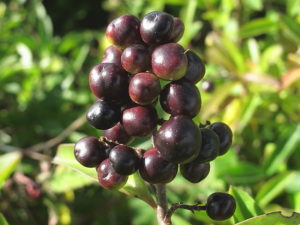Ligustrum fruit comes from a genus of about forty different species and is commonly known as privet. This herb is found across the globe, especially in its different forms. The flowers have a slightly unpleasant and strong odor. These plants grow fast and are dense. They do not grow very tall and are easily maintained. This evergreen shrub bears fruit in abundance but most of them are normally eaten up by birds. The leaves are known to be wavy and can be easily pruned as required.
Contents
Uses
-
Ligustrum, or privet fruit, is an excellent digestive aid, it may be of benefit in chronic bowel complaints and ulcerations of the stomach and bowels
Benefits
-
- The herb is useful in making a tonic that is commonly used as an immune booster.
- The fruit that is derived from this herb can be used by women in the treatment of menopause and its symptoms.
- Ligustrum is also very good to improve vision. It can help combat spots in front of the eyes, wavering vision and even improve vision. It is also known to reduce macular degeneration.
- The herb is an effective remedy option in the treatment of tinnitus or the ringing of the ear.
- The herb can also be used in the treatment of dizziness and soreness in muscles including sore lower back muscles.
- Ligustrum is also known to arrest premature graying of hair.
- This herb is also a part of the traditional remedy for treating vertigo and other related problems.
- This herb is often given to patients of cancer or HIV as it helps towards improving their immunity. In some cases, it has shown that regular ingestion can even help in the prevention of cancer. It has also shown promise suppressing inflation though there is little scientific evidence to back this claim.
- Ligustrum is also known to have an antibacterial and antiviral effect.
Cautions
- There are no apparent or reported adverse effects of this herb. It does not seem to have any contraindications with other medications. There isn’t enough research done on this herb and for that reason, you need to ingest it carefully. Pregnant women and women who breast feed should best avoid this herb.
Interactions
n/a
Other names
Privet, Common Privet, Wild Privet, European Privet
References
Source: HomeRemediesForYou, http://www.home-remedies-for-you.com/herbs/ligustrum.html
Naturalalternatives, http://naturesalternatives.com/herbs/liquid-extracts/lpfxs-chinese-ligustrum-privet-fruit-extract.html
Image source: http://www.wildlifeinsight.com

